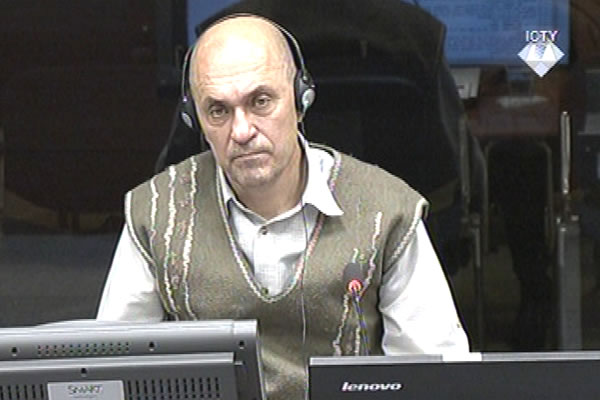Home
SNIPERS ‘WERE ONLY KIDDING’
In his evidence in Mladic’s defense former UNPROFOR member Sergey Moroz has played down the suffering of Sarajevo citizens during the war-time siege. When the prosecutor told him that Serb snipers would open fire at UN troops, Moroz said that he had been targeted too, but in his opinion, the shooters were ‘only kidding’ and they did not actually want to kill him
 Sergej Moroz, defence witness at Rako Mladic trial
Sergej Moroz, defence witness at Rako Mladic trial From October 1993 to October 1994 Sergey Moroz, a lieutenant colonel from Ukraine, headed the UNPROFOR military engineering unit charged with repairing the electricity and water supply facilities in Sarajevo. Just as he did in his previous testimony at Karadzic’s trial, today Moroz blamed the BH Army for the incidents in Sarajevo and played down the suffering of Sarajevo citizens. He claimed their plight was not nearly as bad as it is often depicted.
According to Moroz, Muslims were responsible for water shortages because the water supply valves were shut down in the areas they controlled. The power lines were damaged by gunfire from both sides. According to Moroz’s evidence, water shortages were not such a big problem. During his tour of duty, the water supply was cut off for two weeks on only one occasion: that was the longest time that the city had no water. On other occasions, water supply would be cut for two or three days. In most cases, the problem was low pressure in the pipes, Moroz explained.
Moroz accused the BH Army of opening fire at the Serb troops from the city, mostly from the PTT building and the Marsal Tito barracks; the goal was to provoke the Serbs to fire back. Moroz also claimed that a Russian officer by the name of Rumyantsev, who took part in the investigation of the first explosion at the Markale market on 5 February 1994, told him that the explosion wasn’t caused by a 120-mm shell and that the Serbs were not responsible.
In the cross-examination, the prosecutor didn’t dwell long on the Markale incident. In just a few minutes, the prosecutor established that the witness didn’t have any expert ballistic knowledge. Also, Moroz didn’t participate in the investigation and didn’t even see the official UPROFOR incident report. The rest of the cross-examination dealt with the utilities during the war. The prosecution alleges that the problems the Sarajevans faced were much more serious than the witness recounted in his evidence. The provision of the utilities in Sarajevo in most cases depended on the whim of the Serb leadership.
A World Health Organization report from October 1993 states that the Serbs had cut off the water supply from a well, and the water situation was rendered even more dire because of the power cuts. This resulted in an increase in the number of hepatitis A cases among the Sarajevo citizens. Moroz agreed that this picture ‘is indeed quite like’ the situation he witnessed in Sarajevo in that period. However, Moroz argued that from February 1994, after the Markale attack and the signing of a cease fire agreement, until his departure in October 194 the situation was significantly calmer. Moreover, according to Moroz, he and other UNPROFOR staff even took to jogging down the street they nicknamed the ‘Sniperstrasse’. The Sarajevo citizens referred to the street as the Sniper Alley.
According to the reports produced both by UNPROFOR and the municipal services, and those published by the foreign press, the worst situation was in September 1994 when water supply was cut for 10 days. The cut was caused in part by a storm that had damaged the power lines and partly by the Serb authorities’ decision to divert the water to the areas it controlled. The citizens had to go down to the Miljacka river. As described in a newspaper article from that time, the ‘key traffic’ involved carts loaded with water canisters. The witness didn’t remember the great water shortage, adding that the media often lied.
The witness was confronted with the evidence showing that the Serb side had opened fire at UNPROFOR teams as they worked on repairing the utilities. The Serb snipers in fact opened fire on Moroz himself, he recounted, but it was his impression that they ‘were just kidding’. According to Moroz, the bullets hit the ground near his feet; he was sure that if the snipers had wanted to kill him, they could have easily done so. As alleged by the prosecution, the utilities were controlled by the Bosnian Serb authorities headed by Radovan Karadzic and Ratko Mladic. The prosecutor showed several documents corroborating the allegation but Moroz didn’t comment on them.
Ratko Mladic’s trial continues on Monday.
Linked Reports
- Case : Mladic
- 2015-12-09 LISBON AGREEMENT – CHANCE FOR PEACE OR PLAN TO DESTROY BOSNIA?
- 2015-12-08 DODIK: SDS PARTY LEADERSHIP INVOLVED IN WAR CRIMES
- 2015-12-07 FROM ISLAMIC DECLARATION TO ISLAMIC STATE
- 2015-12-14 MLADIC’S EXPERT ON SREBRENICA COLUMN OF SOLDIERS AND CIVILIANS
- 2015-12-15 SELF-SHELLING FOR ‘THE RIGHT CAUSE’
- 2015-12-17 WHAT CARL BILDT KNEW ABOUT SREBRENICA
